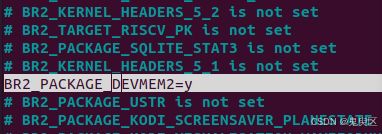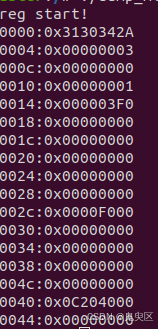devmem源码解读
缘起
因为开发视频流驱动程序,发现在驱动里面加入读写硬件模块的寄存器,然后通过log输出,或者通过proc和sysfs的文件节点输出,如果链路一长,每个模块都要增加这样的输出,工作量还是比较大的,而且随时都要修改。
在网上发现linux上有基于mmap的 devmem这样的工具文章的介绍(如下),使用这样的方式来访问,不用增加如何代码实现直接操作寄存器,还是比较方便的。
https://blog.csdn.net/gatieme/article/details/50964903
Linux驱动开发常用调试工具—之内存读写工具devmem和devkmem
https://blog.csdn.net/gatieme/article/details/50964903
【U-Boot && Linux命令】:【内存操作md、mw】、【nand flash操作】
确认
在buildroot下面找到并打开ia这样的支持
 然后编译在最终输出目录有devmem的符号连接生成
然后编译在最终输出目录有devmem的符号连接生成
./output/target/sbin/devmem
源码
实际源码在output/build/busybox-xxxx/miscutils/devmem.c,列举如下
/*
* Copyright (C) 2000, Jan-Derk Bakker ([email protected])
* Copyright (C) 2008, BusyBox Team. -solar 4/26/08
* Licensed under GPLv2 or later, see file LICENSE in this source tree.
*/
//config:config DEVMEM
//config: bool "devmem (2.5 kb)"
//config: default y
//config: help
//config: devmem is a small program that reads and writes from physical
//config: memory using /dev/mem.
//applet:IF_DEVMEM(APPLET(devmem, BB_DIR_SBIN, BB_SUID_DROP))
//kbuild:lib-$(CONFIG_DEVMEM) += devmem.o
//usage:#define devmem_trivial_usage
//usage: "ADDRESS [WIDTH [VALUE]]"
//usage:#define devmem_full_usage "\n\n"
//usage: "Read/write from physical address\n"
//usage: "\n ADDRESS Address to act upon"
//usage: "\n WIDTH Width (8/16/...)"
//usage: "\n VALUE Data to be written"
#include "libbb.h"
int devmem_main(int argc, char **argv) MAIN_EXTERNALLY_VISIBLE;
int devmem_main(int argc UNUSED_PARAM, char **argv)
{
void *map_base, *virt_addr;
uint64_t read_result;
uint64_t writeval = writeval; /* for compiler */
off_t target;
unsigned page_size, mapped_size, offset_in_page;
int fd;
unsigned width = 8 * sizeof(int);
/* devmem ADDRESS [WIDTH [VALUE]] */
// TODO: options?
// -r: read and output only the value in hex, with 0x prefix
// -w: write only, no reads before or after, and no output
// or make this behavior default?
// Let's try this and see how users react.
/* ADDRESS */
if (!argv[1])
bb_show_usage();
errno = 0;
target = bb_strtoull(argv[1], NULL, 0); /* allows hex, oct etc */
/* WIDTH */
if (argv[2]) {
if (isdigit(argv[2][0]) || argv[2][1])
width = xatou(argv[2]);
else {
static const char bhwl[] ALIGN1 = "bhwl";
static const uint8_t sizes[] ALIGN1 = {
8 * sizeof(char),
8 * sizeof(short),
8 * sizeof(int),
8 * sizeof(long),
0 /* bad */
};
width = strchrnul(bhwl, (argv[2][0] | 0x20)) - bhwl;
width = sizes[width];
}
/* VALUE */
if (argv[3])
writeval = bb_strtoull(argv[3], NULL, 0);
} else { /* argv[2] == NULL */
/* make argv[3] to be a valid thing to fetch */
argv--;
}
if (errno)
bb_show_usage(); /* one of bb_strtouXX failed */
fd = xopen("/dev/mem", argv[3] ? (O_RDWR | O_SYNC) : (O_RDONLY | O_SYNC));
mapped_size = page_size = bb_getpagesize();
offset_in_page = (unsigned)target & (page_size - 1);
if (offset_in_page + width > page_size) {
/* This access spans pages.
* Must map two pages to make it possible: */
mapped_size *= 2;
}
map_base = mmap(NULL,
mapped_size,
argv[3] ? (PROT_READ | PROT_WRITE) : PROT_READ,
MAP_SHARED,
fd,
target & ~(off_t)(page_size - 1));
if (map_base == MAP_FAILED)
bb_simple_perror_msg_and_die("mmap");
// printf("Memory mapped at address %p.\n", map_base);
virt_addr = (char*)map_base + offset_in_page;
if (!argv[3]) {
switch (width) {
case 8:
read_result = *(volatile uint8_t*)virt_addr;
break;
case 16:
read_result = *(volatile uint16_t*)virt_addr;
break;
case 32:
read_result = *(volatile uint32_t*)virt_addr;
break;
case 64:
read_result = *(volatile uint64_t*)virt_addr;
break;
default:
bb_simple_error_msg_and_die("bad width");
}
// printf("Value at address 0x%"OFF_FMT"X (%p): 0x%llX\n",
// target, virt_addr,
// (unsigned long long)read_result);
/* Zero-padded output shows the width of access just done */
printf("0x%0*llX\n", (width >> 2), (unsigned long long)read_result);
} else {
switch (width) {
case 8:
*(volatile uint8_t*)virt_addr = writeval;
// read_result = *(volatile uint8_t*)virt_addr;
break;
case 16:
*(volatile uint16_t*)virt_addr = writeval;
// read_result = *(volatile uint16_t*)virt_addr;
break;
case 32:
*(volatile uint32_t*)virt_addr = writeval;
// read_result = *(volatile uint32_t*)virt_addr;
break;
case 64:
*(volatile uint64_t*)virt_addr = writeval;
// read_result = *(volatile uint64_t*)virt_addr;
break;
default:
bb_simple_error_msg_and_die("bad width");
}
// printf("Written 0x%llX; readback 0x%llX\n",
// (unsigned long long)writeval,
// (unsigned long long)read_result);
}
if (ENABLE_FEATURE_CLEAN_UP) {
if (munmap(map_base, mapped_size) == -1)
bb_simple_perror_msg_and_die("munmap");
close(fd);
}
return EXIT_SUCCESS;
}
批量处理
做成shell脚本(如下),可以集中dump出寄存器状态,也可以集中修改来配合调试。
table=(
0x00000000
0x00000004
0x0000000C
0x00000010
0x00000014
0x00000018
0x0000001C
0x00000020
0x00000024
0x00000028
0x0000002C
0x00000030
0x00000034
0x00000038
0x0000004C
0x00000040
0x00000044
)
echo "reg start!"
for reg_addr in ${table[@]}; do
printf "0x%08x:" $reg_addr
busybox devmem $reg_addr
done
